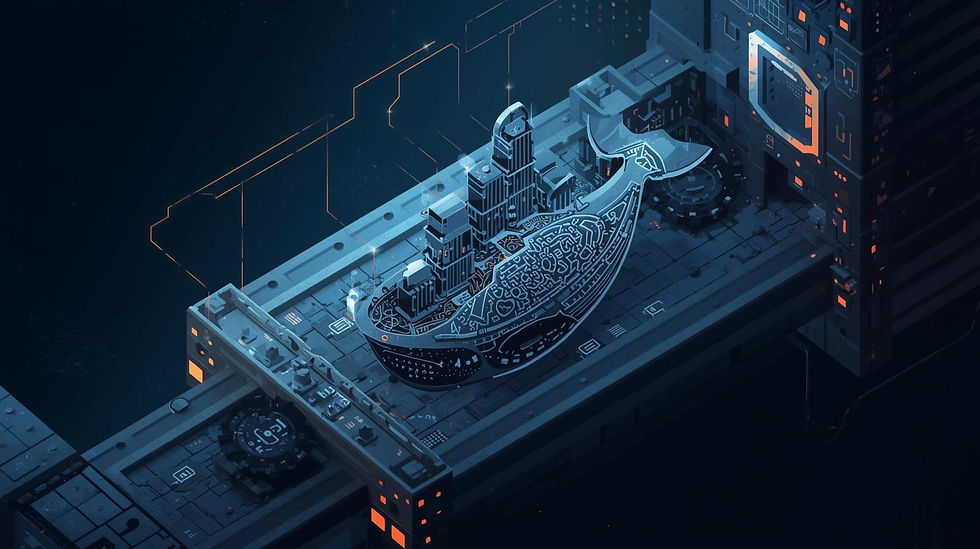The Unseen Shield: Understanding the Importance of Cloud Security for Businesses
- Aug 24, 2025
- 5 min read

In today's digital landscape, where businesses are increasingly reliant on cloud services, understanding cloud security has never been more critical. As organizations transition to cloud environments, they face unique challenges and threats that necessitate robust security measures. In this blog post, we'll delve into the key reasons why cloud security is essential for businesses, the various facets of security in the cloud, and best practices for enhancing the safety of your cloud infrastructure.
The Rise of Cloud Computing
The rise of cloud computing has transformed how businesses operate. From file storage to complex software solutions, the cloud provides a flexible, scalable environment that allows businesses to thrive. However, with this transition come new vulnerabilities and security concerns that organizations cannot afford to overlook.
Understanding Cloud Security
Cloud security encompasses a variety of strategies and technologies designed to protect data and applications in cloud environments. This includes everything from data encryption and access controls to intrusion detection and incident response. Effective cloud security helps safeguard personal information, intellectual property, and business assets from cyber threats.
Key Elements of Cloud Security
When talking about cloud security, several critical elements come into play:
Identity and Access Management (IAM): Ensuring that only authorized individuals have access to cloud resources is paramount. IAM helps in controlling user permissions and enforcing policies associated with cloud usage.
Data Protection: This involves protecting data at rest and in transit using encryption methods that ensure only authorized users can access sensitive information.
Network Security: Protecting cloud infrastructure from network-based attacks, such as DDoS, is essential. This includes firewalls, threat detection systems, and secure VPNs.
Compliance and Governance: Businesses must adhere to legal, regulatory, and industry standards regarding data protection and privacy, which requires a firm grasp of compliance frameworks.
The Role of DevOps in Cloud Security
With the increasing integration of DevOps security practices, the responsibility for cloud security has become a shared one among development and operations teams. Adopting a DevOps approach enhances collaboration between teams and embeds security in the development lifecycle.
Integrating Security into DevOps
To ensure robust DevOps security, organizations should consider:
Automation: Automating security checks and compliance assessments can significantly improve the security posture while maintaining development speed.
Continuous Monitoring: Implementing continuous security monitoring helps in detecting vulnerabilities and threats in real-time, allowing for swift action.
Training and Awareness: Educating team members about security best practices fosters a security-first mindset in development teams.
Security Considerations for Containers: Kubernetes and Docker
With the growing popularity of containerized applications, Kubernetes security and Docker security have emerged as critical concerns for businesses operating in the cloud. Containers offer numerous advantages, including portability and resource efficiency, but they also introduce specific security challenges.
Best Practices for Kubernetes Security
To effectively manage Kubernetes security, organizations should:
Implement Role-Based Access Control (RBAC): This ensures that only the necessary users have access to specific Kubernetes resources.
Regularly Audit Configurations: Conduct regular audits to ensure that the configurations are secure and adhere to best practices.
Use Network Policies: Define network policies to control traffic between pods to minimize potential attack vectors.
Securing Docker Environments
Docker security is equally crucial, as vulnerabilities in containerized applications can expose businesses to risks. Organizations can enhance Docker security by:
Using Trusted Images: Always derive containers from trusted sources and perform vulnerability scanning to avoid insecure images.
Minimize Container Privileges: Run containers with the least privileges necessary to limit potential impacts from any security breaches.
Maintain Updated Versions: Regularly update Docker and its dependencies to patch known vulnerabilities and enhance security features.
The Vitality of Storage Security
Storage security is an essential component of cloud security. As businesses store sensitive data in the cloud, securing these storage resources is critical to maintaining integrity and confidentiality. Here are some aspects to focus on:
Data Encryption: Ensure data is encrypted both at rest and in transit to prevent unauthorized access.
Regular Backups: Implement regular backup procedures to safeguard against data loss due to breaches or system failures.
Access Controls: Set stringent access controls for storage solutions to prevent unauthorized individuals from accessing sensitive data.
Common Threats to Cloud Security
Businesses must remain aware of common threats that can compromise cloud security. Understanding these threats is the first step in defending against them.
Data Breaches: Unauthorized access to sensitive information can lead to severe consequences, including regulatory penalties and reputational damage.
Malware and Ransomware Attacks: Malicious software can target cloud resources, encrypting critical data and demanding payment before access is restored.
Misconfigurations: Improperly configured cloud resources can lead to vulnerabilities and expose systems to threats.
Insider Threats: Employees or contractors with access to sensitive information may exploit their privileges, intentionally or unintentionally compromising security.
Building a Strong Cloud Security Strategy
To fortify cloud security, businesses should consider the following strategic approaches:
Evaluate Cloud Providers: Choose cloud service providers that prioritize security, offer transparent security measures, and comply with relevant standards and regulations.
Develop a Comprehensive Security Policy: Create a security policy that outlines roles and responsibilities, incident response procedures, and best security practices.
Regularly Test Security Measures: Conduct penetration testing and security audits to identify weaknesses and ensure that security measures are effective.
Stay Informed: Keeping up with the latest security trends and threats is essential for proactive mitigation of emerging risks.
Final Thoughts
Cloud security is not merely an IT concern; it is a core business issue that influences every aspect of operations. By investing in security measures tailored to your specific needs and by fostering a culture of security awareness within your organization, you will not only protect your valuable assets but also build trust with your customers.
As we navigate the complexities of the digital age, embracing cloud security is more than just safeguarding data; it’s about empowering your business to thrive securely in a cloud-first world. Remember, a fortified cloud infrastructure is your organization's best defense against evolving cyber threats, and with the right practices, you can secure your future.
FAQs
What is cloud security and why is it important for businesses?
Cloud security encompasses various strategies and technologies designed to protect data and applications in cloud environments, safeguarding personal information, intellectual property, and business assets from cyber threats.
What are the key elements of cloud security?
The key elements of cloud security include Identity and Access Management (IAM), data protection, network security, and compliance and governance.
How can DevOps practices enhance cloud security?
DevOps practices enhance cloud security by promoting collaboration between development and operations teams, automating security checks, implementing continuous monitoring, and fostering security awareness training.
What security considerations should businesses keep in mind when using containers like Kubernetes and Docker?
Businesses should implement Role-Based Access Control (RBAC), regularly audit configurations, use network policies for Kubernetes, and ensure trusted images, minimize container privileges, and maintain updated versions for Docker.
What common threats do businesses face regarding cloud security?
Common threats to cloud security include data breaches, malware and ransomware attacks, misconfigurations, and insider threats.
The Unseen Shield: Why Cloud Security Matters More Than Ever
Your business data is your greatest asset—and your biggest vulnerability. In a world of rising cyber threats, cloud security isn't optional. It's essential.
Don’t leave your business exposed.
Partner with Ananta Cloud to build a resilient, secure, and compliant cloud infrastructure tailored to your needs.
Let us help you uncover hidden risks and fortify your digital future.




Comments